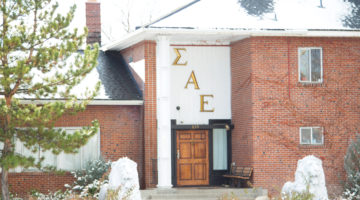
Sigma Phi Epsilon tabling at club fair on Aug. 30. The policies placed on greek life organizations at the university are causing divides amongst members and inhibiting philanthropy success.
Editor’s note: The member of the sorority wished to remain anonymous in fear of retaliation from both her chapter and the Office of Fraternity and Sorority Life. In addition to keeping her identity private, her chapter will not be named.
After the disaffiliation of fraternities in February and forming of the Independent Interfraternity Council on May 25, both fraternities and sororities on campus are feeling the divisions placed between them by Fraternity and Sorority Life.
Five fraternities at the University of Nevada, Reno, became disaffiliated from the university after choosing not to comply with university regulations. The regulations included a requirement for a live-in advisor at each fraternity house before 2020, and to turn in a comprehensive report detailing any incidents or conduct involving individual chapter members at the end of every semester.
Four of the five unrecognized fraternities — Alpha Tau Omega, Kappa Alpha, Zeta Psi and Theta Chi — came together in May to form the IIFC. Kappa Sigma remains unrecognized by the university and has not joined the IIFC.
“As fraternities discussed the 2018 Relationship Agreement with UNR — a document that outlines the official expectations of the Greek organizations and the university — we were concerned about one of the items that we felt would have a chilling effect on our ability to hold brothers accountable through our peer-to-peer process,” IIFC President Brennan Jordan said. “Unfortunately due to this issue, many organizations were unable to carry on operating as fraternities recognized by the university.”
Due to the loss of recognition of the fraternities, the Office of Fraternity and Sorority Life has been adamant about not endorsing any of the unrecognized fraternities.
“An ‘unrecognized’ fraternity or sorority is one who chooses not to seek University recognition and/or does not follow University of Nevada, Reno policies and regulations or the requirements and policies of their respective governing council,” the Office of Fraternity and Sorority Life writes on their website. “Unrecognized fraternities and sororities do not have any of the privileges that recognized organizations have earned. We do not encourage University students to join these organizations. In many cases, these organizations seem to operate like recognized organizations, but they are NOT affiliated with the University of Nevada, Reno. When organizations choose not to seek recognition from the University, they are no longer eligible for the same opportunities or resources that the campus provides to recognized organizations.”
According to Jordan, the creation of the IIFC was a way for unity in a time of disarray.
“The organizations soon realized the need to come together as a group in order to positively develop fraternity and community culture,” Jordan said. “The leaders of the national and local organizations came together to form the Independent Interfraternity Council in Spring 2018 with the purpose of promoting safety, integrity service and unity within our community.”
In addition to losing recognition from the university for failure to comply, the disaffiliated fraternities have not been allowed to hold relationships with recognized Greek life organizations like they once were able to. According to a member of a sorority, the disaffiliation of fraternities has had a tremendous impact on the relationship between sorority chapters with both the fraternity chapters and the school.
“It feels as if the school is trying to dictate who the sororities interact and spend their time with,” the sorority member said. “However, it feels like we have no say whatsoever. It’s also been taking the fun out of Greek life and now we only have old memories to rely on. Sororities are also not allowed to wear disaffiliated fraternity apparel. And let me tell you we all take pride in wearing Greek letters and want to wear our favorite shirts to represent them. However we will get in trouble if we get caught being seen in one of their shirts. It feels like FSL is control hungry in this situation where they want to dictate what we wear, who we are friends with, and etc. This makes people resent the school and want to lash against it. I know people who want to transfer to other schools just because our fraternity and sorority life has changed to the point where we feel helpless without a voice against the school. This is impacting our relationships. Our philanthropies. Our school.”
In addition to regulations from the Office of Fraternity and Sorority Life dictating that sorority members are not to spend time with unrecognized fraternities, the Office of FSL has also ordered that unrecognized fraternity members are not to attend sorority philanthropy events and vice versa.
“They are not allowed to participate nor attend philanthropy events — and same goes for us — that sororities have for their chapter to raise money for their philanthropic organization,” the source said. “So this takes huge amounts of potential money away from these organizations because there are a significant number of chapters that have more than, let’s say, 50 members not being able to participate in these events regardless of how many times they have tried to negotiate with the head of fraternity and sorority life so they can give money and participate.”
According to Jordan, the organizations of the IIFC are not allowed to donate money to sorority philanthropies due to the loss of recognition.
“We have not received official communication from the university on this, but we have heard the sororities were instructed by the university that they could not even accept donations made by our organizations to their philanthropies,” Jordan said. “We were not permitted to donate money to sorority philanthropies such as Saint Jude’s Children’s Research Hospital, Court Appointed Special Advocates which advocated for children and families or Service for Sight which is an organization focused on vision preservation and conservation.”
The IIFC does not agree with these strict regulations according to Jordan and they “urge the university to reconsider their level or enforcement in this area” as they feel it is counterproductive.
In addition to being directed on what members are allowed to wear and who is allowed to attend philanthropy events, the source said the university has been managing social media interactions as well.
“I know someone who is in another chapter that got in trouble for liking a Twitter post from the IIFC,” the source said.
While divides between the unrecognized fraternities and sororities are strong now, Jordan does not feel as though the fraternities of the IIFC will remain permanently disaffiliated.
“I don’t think this is permanent,” Jordan said. “We may stay disaffiliated during the end of my time at the university, but I don’t think it’s really long term. We’re hoping the university will reconsider some regulations they have placed so we can reaffiliate as being affiliated with the university does have great opportunities and resources.”











